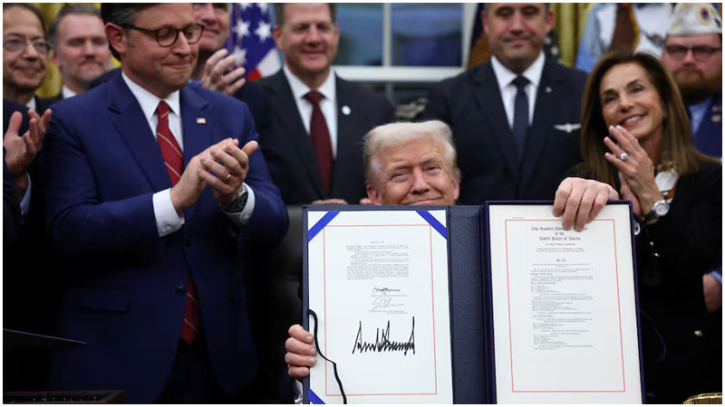Trump signs bill to end longest U.S. government shutdown

President Donald Trump on Wednesday signed legislation to end the longest government shutdown in U.S. history, concluding a 43-day standoff that had paralyzed key federal operations and left hundreds of thousands of workers without pay.
The House of Representatives passed the funding package earlier in the evening by a vote of 222–209, restoring funding for food assistance, air traffic control, and other essential services. The bill, which had already cleared the Senate, extends government funding through January 30.
Although the deal provides only a short-term reprieve, it allows federal employees to return to work as early as Thursday. The shutdown’s long-term economic effects remain uncertain, with the U.S. government projected to continue adding roughly $1.8 trillion annually to its $38 trillion debt.
“I feel like I just lived a Seinfeld episode — 40 days and I still don’t know what the plotline was,” said Rep. David Schweikert of Arizona, reflecting on the prolonged impasse. “What’s happened now when rage is policy?”
The shutdown’s resolution offers hope for smoother air travel ahead of the busy Thanksgiving holiday season and the reinstatement of food aid to millions of families. It will also allow federal agencies to resume releasing key economic data, including employment and inflation figures, that had been delayed or disrupted. Some reports, however, may never be published.
Economists estimate the shutdown shaved more than a tenth of a percentage point off the nation’s GDP each week it persisted, though much of the lost output is expected to be recovered in coming months.
The vote came just over a week after Democrats scored several major election victories, which many in the party believed strengthened their position on extending federal health insurance subsidies set to expire at year’s end. While the new agreement sets up a December Senate vote on the issue, House Speaker Mike Johnson has made no such commitment.
Departing Rep. Mikie Sherrill of New Jersey, who was recently elected governor of her state, used her final House floor speech to criticize the bill and urge lawmakers to challenge the Trump administration’s policies.
“To my colleagues: Do not let this body become a ceremonial red stamp for an administration that takes food away from children and rips away healthcare,” Sherrill said. “To the country: Stand strong. As we say in the Navy, don’t give up the ship.”
Despite the resolution, neither party emerged as a clear political winner. A Reuters/Ipsos poll released Wednesday found that 50 percent of Americans blamed Republicans for the shutdown, while 47 percent blamed Democrats.
The House returned to session for the first time since mid-September, immediately setting off renewed debate over unrelated issues, including the release of unclassified records related to Jeffrey Epstein, the late financier and convicted sex offender.
Newly sworn-in Rep. Adelita Grijalva of Arizona, elected to succeed her late father Raul Grijalva, provided the final signature needed to force a vote on the Epstein records after Democrats published a new batch of documents earlier in the day.
In addition to reopening the government, the funding measure also includes a provision allowing eight Republican senators to seek damages for alleged privacy violations tied to the Justice Department’s investigation of the January 6, 2021, Capitol attack. The bill retroactively restricts the collection of senators’ phone data without disclosure and allows those affected to sue for up to $500,000 in damages plus legal fees.
.png)




